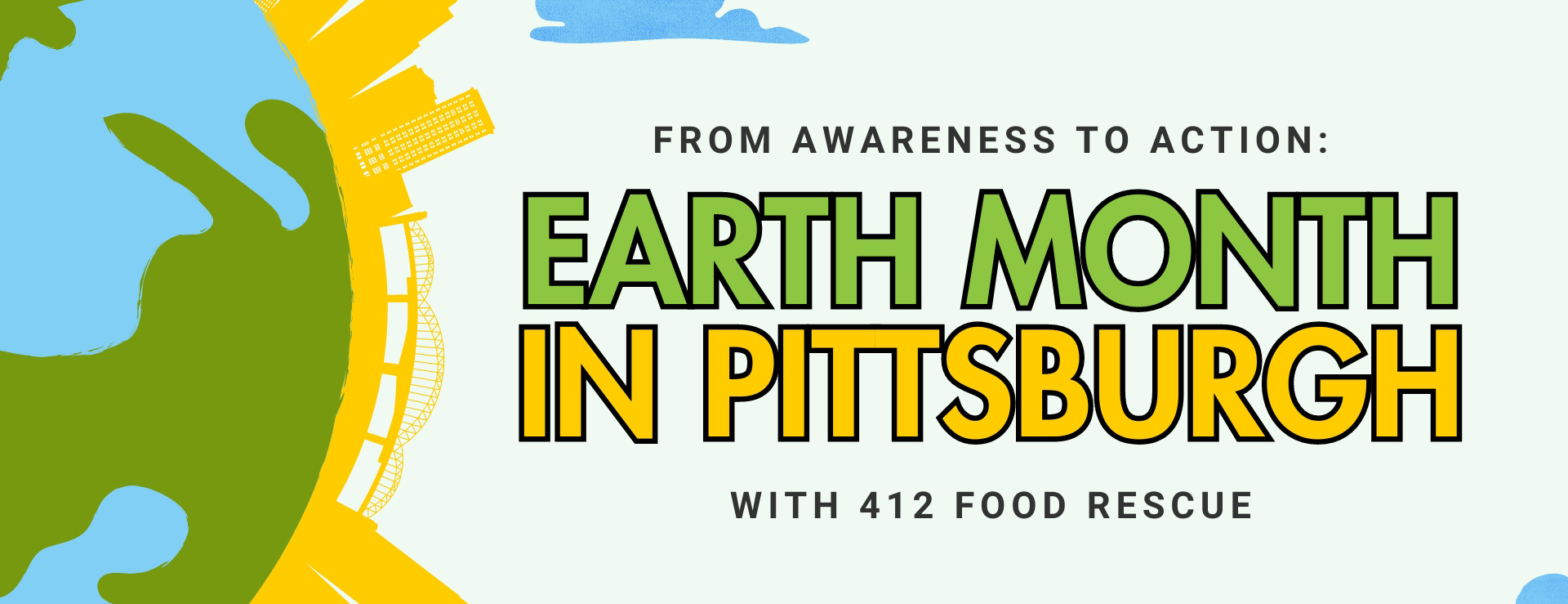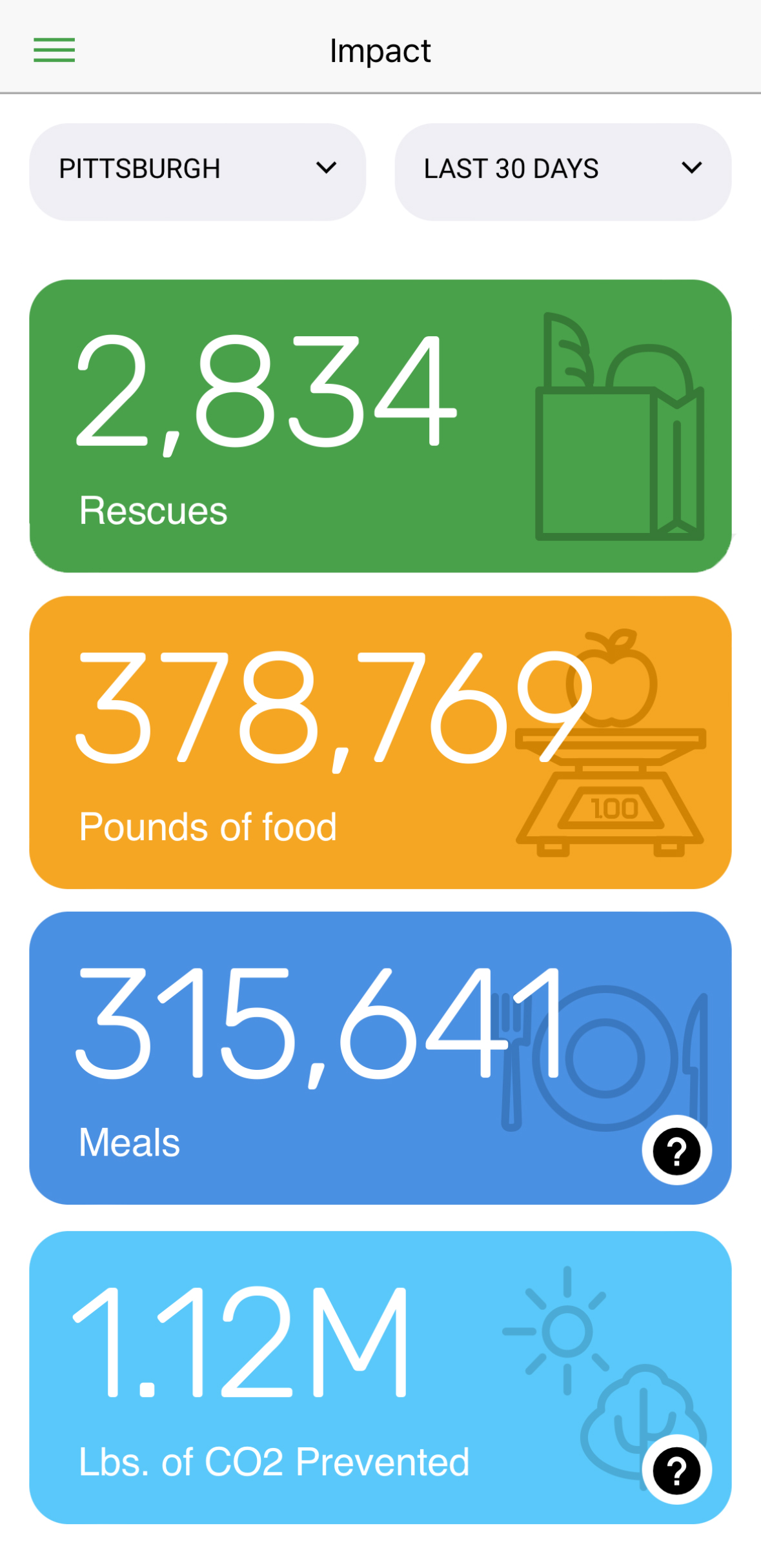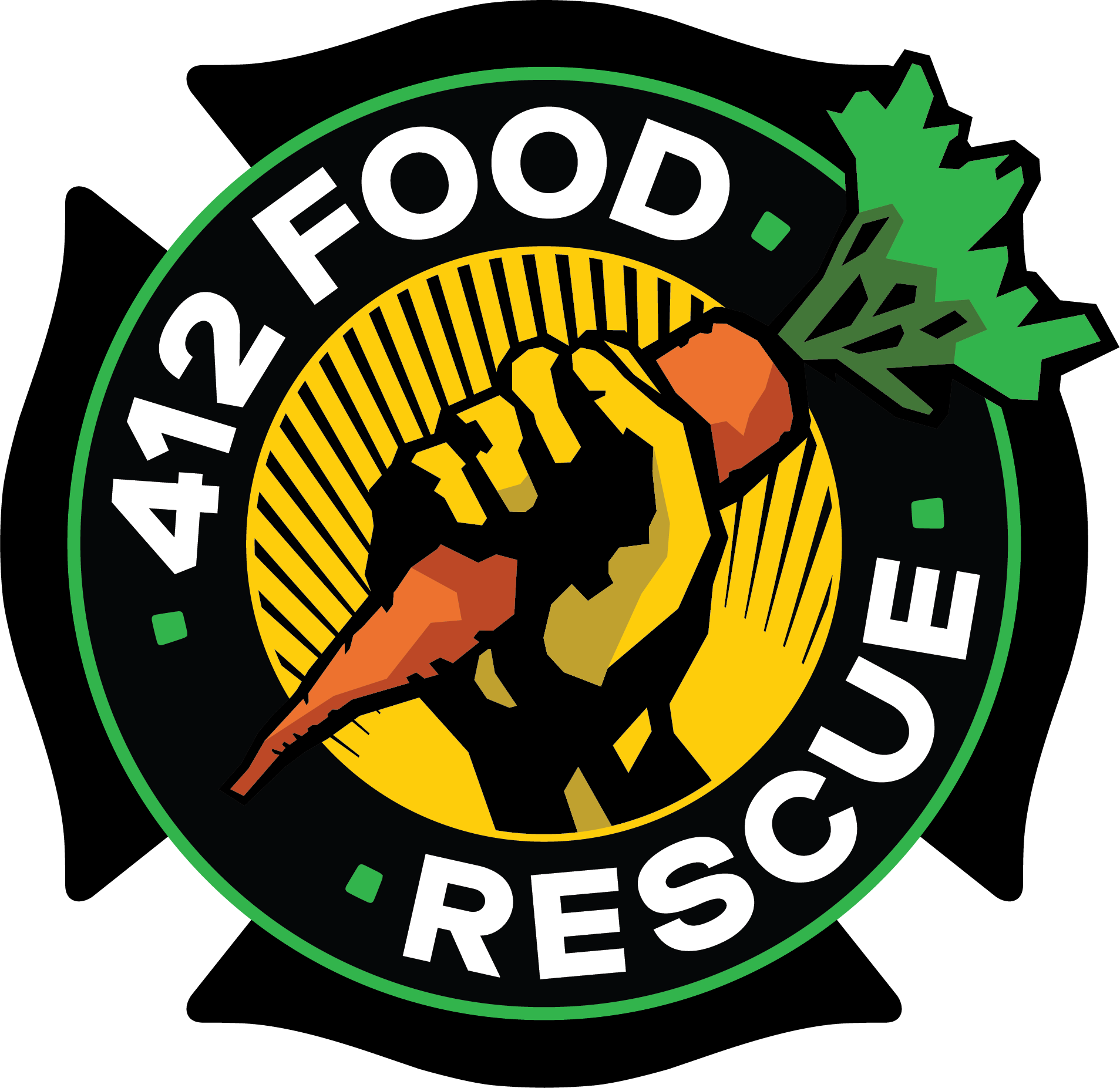
Since 2015, Pittsburgh has mitigated over 60 million pounds of greenhouse gas emissions from entering the atmosphere through one solution–food rescue.
How is food rescue sustainable?
Food rescue encompasses more than just addressing food insecurity in our communities; it’s a multifaceted solution with far-reaching impacts. At its core, food rescue intercepts surplus food from various points in the supply chain, diverting it from landfills and redistributing it to those in need. This process not only alleviates food insecurity but also significantly reduces greenhouse gas emissions associated with decomposing organic matter in landfills and all the way back to energy and resources used to grow and transport the food. The environmental impact of recovering this food goes all the way up the supply chain.
See, up to 40% of the food produced in the U.S. for human consumption winds up going to waste. Which means from growing to transport to warehouse, the water/energy/emissions from every step in that food’s life cycle is also being wasted. By redistributing surplus food to communities, food rescue reduces the waste of these precious resources, ensures any emissions thus far aren’t in vain, and reduces the need for additional agricultural production, which conserves further water, energy, and other resources required for food growing and processing.
Not to mention the greenhouse gas emissions that are created from organic matter in landfills: each year, a staggering 7.3 million tons of food end up in U.S. landfills, emitting approximately 15.3 million tons of CO2eq. Notably, food waste in landfills ranks as the third-highest emitter of greenhouse gasses globally, trailing only China and the United States in total annual emissions.
But what about the environmental impact of using vehicles to redistribute this food all over the city? We’ve done the math there too. Driving 25 miles in city traffic (20mi/gal) yields a carbon footprint of 0.01 metric tons of CO2eq (source). Meanwhile, the average food rescue of 93 pounds of food (which, on average, is transported only 5.5mi by 412 Food Rescue) mitigates 0.11 metric tons of CO2eq from going to waste–yielding a net positive of mitigating ~220 pounds of CO2eq.
So while rescuing food primarily helps address food insecurity and food access in our community, it’s also making a big impact on the environment.

Thankfully, many of the amazing food donors that partner with 412 Food Rescue recognize the value that food recovery brings to sustainability, as it also supports their own internal sustainability efforts.
From our partners:
“The Pitt Sustainability Plan strives to strengthen a mutual environmental responsibility across its campus and community. The University does so by leveraging its partners across the Pittsburgh community to expand its outreach efforts to reduce our joined environmental impact. One example of how they do this is by fostering a culture of equity, access, and landfill diversion.
At Pitt Eats, powered by Chartwells Higher Education, Compass Group USA, our sustainability commitment includes reducing landfill waste and tackling food insecurity. We partner with the Food Recovery Heroes, a student-run organization and extension to the Food Recovery Network. This group of students helps us package meals using food that needs to be recovered from our dining halls.
Yet, our largest partner helping us meet our sustainability goals is 412 Food Rescue. Whether it’s leftovers from a catering event, dining hall overproduction, or perfectly safe retail foods that need to be recovered, 412 Food Rescue volunteers are always ready to help us reach our food-insecure community in the Pittsburgh neighborhood.
By partnering with 412 Food Rescue, we’re diverting our landfill waste while fighting food insecurity. As a food service provider, Pitt Eats loves nothing more than to bring a smile to a person’s stomach.”
– Jose Perez Vela, Sustainability Director, Chartwells Higher Education Dining Services
“I have spent most of my career making the business case for energy efficiency, climate tech innovation, and building performance as a means to address the world’s energy challenges and the global urgency of climate change. I’ve worked for energy – specifically clean energy – for many years, including roles at The Home Depot, global consulting firm ICF, Green Building Alliance here in Pittsburgh, Carnegie Mellon, and now at DOE. The common thread has always been “…how can we use existing measures and new innovative technologies to do cool things to save the planet?”
When it comes to emissions, food waste is one of the worst contributors. I got involved with 412 Food Rescue because I saw a significant opportunity for us to pair together food redistribution, waste reduction, systems optimization, and innovative technology to eliminate a huge portion of food from landfills. That is a really big deal.
I think that we all make decisions on things that we buy and purchase, both at home and at work. By changing those behaviors, we can start to get at the root causes of our waste problem.”
– Anna Siefken, U.S. Department of Energy & 412 Food Rescue Board Member
“At UPMC, we work hard to address the critical importance of both human and planetary health. While many initiatives may only address one of those areas at a time, working with 412 Food Rescue to divert excess food from our facilities to those in need throughout our communities is a clear win-win.
We are grateful to partner with 412 at 10 of our facilities in Allegheny County, our teams thrilled to be a part of the relationship. With our goal to be leaders in healthcare sustainability, reducing carbon footprint while addressing one of the most critical social determinants of health makes this an initiative that everyone can feel good about.“
– Jon Polley, Program Manager, UPMC Center for Sustainability
WHAT YOU CAN DO
Get Involved this Earth Month
April 4 – In honor of Food Waste Prevention Week (April 1-7), join this free educational webinar hosted by Food Rescue Hero about how you can reduce waste at home!
April 10 – Gordon Food Show! We need 10 volunteers from 3:30-5:30pm to help collect and package several pallets worth of donated food from this event. Grab a buddy and sign up to help! This may be a little physical – walking, and lifting.
April 12 – 412 Day! This is OUR day to celebrate all the goodness Pittsburghers represent! Let’s encourage each other to get out this 412 Day and claim a rescue and share the experience with your neighbors, your friends and your colleagues on Instagram, Facebook and Twitter!
April 20 – ICP Weekend! On the third Saturday of every month, 412 Food Rescue partners with the Islamic Center of Pittsburgh to distribute grocery delivery to ~100 households around Greater Pittsburgh. But we need your help to do it! Claim a Home Delivery in the app to help ensure our neighbors experiencing food insecurity have access to nutritious foods.
April 22 – Earth Day! In honor of Earth Day this year, grab a buddy and sign up for our Grocery Bagging Program or a Home Delivery route. Home Deliveries occur every Tuesday, Thursday, and one Saturday a month where volunteers take up to 90 mins to deliver fresh food directly to the doorstops of our most vulnerable neighbors, in collaboration with our generous food donors and nonprofit partners. It’s an incredible way to spend time serving our fellow Pittsburghers in need while keeping fresh, delicious food from getting thrown away.





